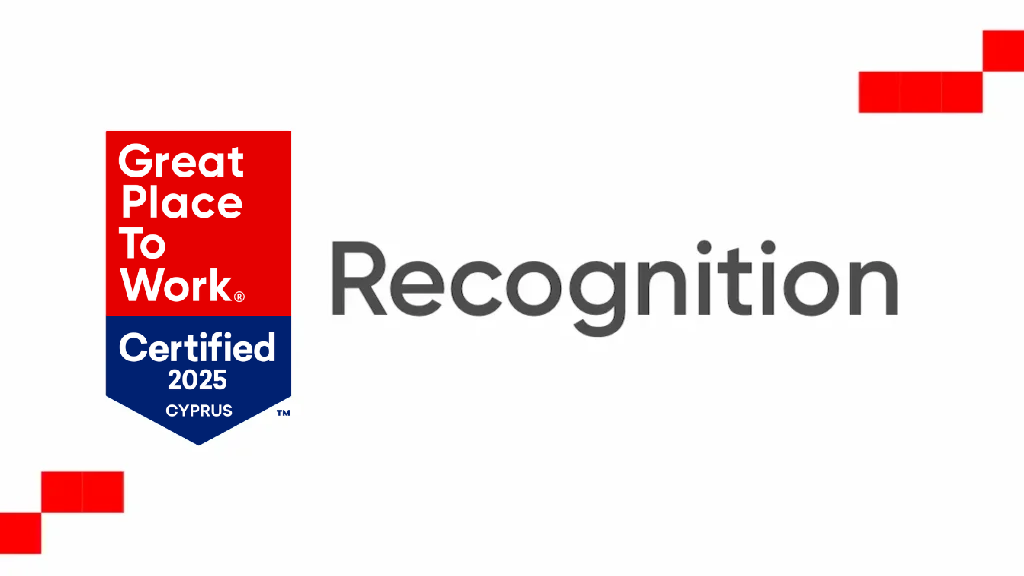
Think about the best job you ever had. Chances are, it wasn’t just the salary that made it memorable—it was the moments when your effort was noticed and appreciated. In Cyprus, an increasing number of companies are recognising that recognition at work is not a “nice-to-have,” but a core driver of motivation, teamwork, and loyalty.
A workplace recognition program is about more than handing out bonuses or awards. It’s a way to show employees that what they do each day truly matters.
When people feel seen and valued, they naturally bring more energy and commitment to their roles, which lifts the whole company in return. For organisations in Cyprus, this can mean higher engagement, stronger retention, and a workplace culture people are proud to belong to.
What is a workplace recognition program?
A workplace recognition program is a purposeful strategy used by organisations to acknowledge and celebrate employees’ efforts, achievements, and positive behaviours in meaningful ways. Unlike simple thank-you notes, these programs are designed to cultivate a lasting culture of appreciation that’s woven into the daily experience of work.
Recognition comes in many forms: peer-to-peer shoutouts, manager praise, team awards, or company-wide celebrations. By offering varied ways to honour success—from informal gestures to formal events—businesses make it easier for every employee to feel seen and valued for their unique contributions.
This flexible approach helps ensure recognition fits the diverse needs of the workforce, making each gesture more personal and impactful. Ultimately, a well-designed program strengthens team spirit and boosts motivation, shaping a workplace where people genuinely want to excel.
How does the workplace recognition program work in Cyprus?
Workplace recognition programs in Cyprus operate through a blend of peer recognition, public acknowledgement, and technology-driven platforms that make appreciation a visible and valued part of company culture. These initiatives encourage both managers and staff to actively highlight the accomplishments and contributions of one another actively, fostering a culture where hard work and success are celebrated openly.
Public recognition often takes the form of praise during team meetings or announcements on digital company platforms, like an intranet “spotlight” for top performers. This not only rewards individuals but also promotes behaviours and values the company wants to reinforce across its workforce.
Many Cypriot organisations use digital recognition platforms that centralise the process. These tools allow anyone to quickly nominate colleagues, present rewards, and track recognition trends, offering valuable insights into overall employee engagement and morale. The underlying goal is to consistently build trust, motivation, and a supportive atmosphere—ultimately enhancing productivity and retention.
How long does a workplace recognition program take in Cyprus?
A workplace recognition program in Cyprus is an ongoing process aimed at cultural transformation, not a short-term initiative or fixed-duration project.
Typical Timeline
- Implementation phase: Setting up the program—such as conducting employee surveys, configuring platforms, creating guidelines, and training staff—may take from several weeks to a few months, depending on company size and complexity.
- Ongoing operation: Recognition is meant to occur regularly and be part of the company’s daily rhythm, so the program itself does not “end.” Continuous efforts ensure it becomes embedded in the workplace culture.
- Results and benefits: Some positive effects, like increased morale or engagement, might emerge within weeks. Deeper benefits, such as improved retention or productivity, are typically seen over several months or longer, and require consistent application to maintain.
The real duration depends on corporate commitment—making recognition an everyday habit and a core part of the organisational environment, with visible improvements over time.
What are the goals of a workplace recognition program in Cyprus?
The main goal of a recognition program in Cyprus is to create a positive and supportive atmosphere. Employees should feel appreciated for what they do. By regularly recognising both big and small successes, organisations aim to foster a culture that values hard work.
This encourages employees to give their best effort. When this happens, there are many good results. These include better employee engagement, more people staying with the company, higher productivity, and a stronger sense of teamwork.
Recognising and appreciating employees isn’t just about lifting spirits; it’s about creating a workplace where people feel valued. This motivates them to help the company succeed.
1. Enhance Trust in the Workplace
The first and most fundamental goal of a workplace recognition program in Cyprus is to strengthen trust within the company. When employees regularly see their hard work and dedication acknowledged by leaders and colleagues, they develop a true sense of security and belonging. This connection not only supports retention but also drives commitment to the company’s mission and values.
Building trust isn’t immediate—it grows through consistent, genuine acts of appreciation over time. Active participation from every level of the organisation reinforces the message that all contributions matter and encourages employees to engage fully.
In this trust-based environment, recognition becomes the backbone of a positive workplace culture—one where people feel safe to share ideas, collaborate, and take initiative. Openness and mutual respect fuel innovation and unify the team to achieve common goals together.
2. Boost Employee Engagement
The second major goal of workplace recognition programs in Cyprus is to elevate employee engagement across the organisation. When employees receive genuine acknowledgement for their work, it gives them a sense of purpose and inspiration—motivating them to invest more effort and enthusiasm into their daily tasks.
This sustained recognition helps create a culture where people are dedicated, productive, and driven to contribute to company success. Collecting employee feedback through regular surveys and conversations allows organisations to refine their approach, ensuring that recognition feels authentic and aligns with what motivates their teams.
Essential elements for boosting engagement include:
- Feeling valued and appreciated: Employees who feel noticed and respected are more likely to remain committed and take pride in their work.
- Clear expectations and goals: Tying recognition to specific achievements helps guide employees toward excellence and clarity in their roles.
- Growth opportunities: Celebrating both achievements and development fosters long-term engagement and loyalty among staff.
By making engagement a priority, Cypriot organisations transform recognition from a simple gesture into a powerful motivator that shapes a thriving and satisfied workforce.
3. Promote Company Values and Culture
The third major goal of a workplace recognition program in Cyprus is to promote core company values and strengthen workplace culture actively. These programs do more than distribute awards—they serve as strategic tools to align daily behaviours with the organisation’s guiding principles.
Recognition becomes especially powerful when criteria are directly linked to values such as teamwork, honesty, customer focus, or creativity. By spotlighting employees who demonstrate these qualities, companies send a clear message about what matters most and inspire others to follow suit.
Over time, this approach attracts talent who share similar values, fostering a cohesive, enthusiastic workforce and turning the organisation into a truly great place to work. For this transformation to be successful, strong leadership and widespread participation are vital—recognition must be woven into daily routines, ensuring every employee feels appreciated, respected, and motivated to excel.
4. Improve Job Satisfaction and Morale
The fourth goal of a workplace recognition program in Cyprus is to boost job satisfaction and employee morale. When workers lack recognition, morale can drop, often leading to disengagement and higher turnover rates.
A well-run recognition program turns this around by making employees feel valued for their contributions. When their efforts are acknowledged—whether through public praise, peer recognition, or thoughtful rewards—they experience a sense of accomplishment and pride in their work. This strengthens their motivation, deepens their connection to their roles, and aligns them more closely with the organisation’s goals.
Fostering a culture of appreciation also strengthens relationships among colleagues and between teams and management. As unity and respect grow, the workplace becomes more enjoyable and fulfilling—lifting overall morale and making work a more positive experience for everyone.
5. Encourage High Performance and Innovation
The fifth key goal of workplace recognition programs in Cyprus is to inspire high performance and foster a culture of innovation. When employees know that their hard work and creative ideas will be recognised, they are motivated to go beyond expectations and seek new solutions to challenges.
Publicly celebrating achievements and rewarding innovative projects helps cultivate a growth mindset within the company. This environment encourages employees to take risks, share fresh ideas, and explore new ways of working, all while knowing their contributions are genuinely valued.
By highlighting and rewarding excellence and ingenuity, companies create a cycle of continuous improvement. Employees feel genuine ownership over their work, which promotes active engagement, dynamic teamwork, and a workplace where innovation thrives.
What are the components of a workplace recognition program in Cyprus?
A good workplace recognition program in Cyprus has a few important parts that work together to make a real difference. These parts aim to ensure that recognition is a big part of the company culture and meets the workers’ different needs. It starts with employee surveys to determine how people like to be recognised.
Then, it sets clear rules for rewards and uses easy-to-navigate platforms. Each part is important for creating a culture of appreciation. For the program to succeed, it needs careful planning and action. This way, recognition can be timely and specific and represent what the organisation stands for.
1. Employee Survey
A well-designed workplace employee survey is a key first step in creating an effective recognition program. It helps gather important employee feedback. This feedback lets organisations see what their employees value and how they like to be appreciated. By knowing what employees prefer and what motivates them, companies can adjust their recognition efforts to have a more significant impact and connect better with their staff.
The survey should ask about different ways of recognition, including public acknowledgement, private thank-you notes, gifts, and more. It should also consider how often recognition occurs and what criteria are used for it. It’s important to provide employees with a safe and private space to give honest feedback. This way, they can share their thoughts and ideas without worrying about negative effects.
Once the survey data is analysed, organisations can spot trends and preferences and find areas for improvement. This data-based method ensures that the recognition program meets the workers’ specific needs. Ultimately, it helps create a culture of genuine employee appreciation.
2. Culture Audit
Conducting a culture audit is essential for understanding the current workplace culture. It helps find areas where a recognition program can make a big difference. This process looks at the organisation’s values, how people communicate, leadership behaviours, and the overall employee experience. It can show gaps between the culture people want and the employees’ actual experience.
The culture audit can use different methods, like employee surveys, focus groups, and interviews, to collect valuable data. Examining this information gives insights into how people view recognition in the organisation. It can reveal both strengths and areas that need improvement.
By fully understanding the company culture, organisations can create a recognition program that fits their needs. Whether it’s about boosting teamwork, encouraging new ideas, or building a strong work ethic, the culture audit helps ensure that the recognition program matches the organisation’s goals and values.
3. Certification and Recognition
Building a multi-faceted recognition program often includes incorporating certifications and achievement awards to recognise exceptional contributions and milestones. These tangible forms of acknowledgement celebrate individual and team accomplishments and foster a culture of excellence and continuous improvement.
Certification programs tied to professional development and skills enhancement demonstrate the organisation’s commitment to employee growth. At the same time, achievement awards acknowledge outstanding performance, innovation, or adherence to company values. Meaningful recognition extends beyond simply handing out certificates or trophies; it’s about highlighting the significance of the achievement and its positive impact on the organisation.
Here are some examples of how certifications and recognition can be structured:
| Category | Description | Recognition Type |
| Skills Development | Completion of a specialized training program, earning an industry-recognized certification | Certificate of Completion, Public Acknowledgement, Promotion Opportunities |
| Project Success | Successfully delivering a high-impact project, exceeding client expectations | Team Celebration, Bonus, Public Recognition |
| Values Champion | Consistently demonstrating core company values, going above and beyond to embody the organization’s mission | Values Champion Award, Gift Certificate, Special Project Leadership |
Can a workplace recognition program reduce turnover?
Yes, a workplace recognition program can significantly reduce turnover in Cyprus by creating a positive environment where employees feel valued and appreciated for their contributions.
How Recognition Lowers Turnover
- Employees who regularly receive meaningful recognition are less likely to leave, as they develop stronger bonds with the company and feel a sense of belonging.
- These programs help foster loyalty, satisfaction, and engagement, making staff more motivated to stay rather than seek opportunities elsewhere.
- Research shows that organisations with effective recognition programs see substantially lower employee turnover rates compared to those without, with some studies indicating up to 31% lower turnover for companies that prioritise recognition.
Consistent appreciation not only improves morale but also cuts costs by reducing the need to hire and train new employees—ultimately driving long-term retention and overall business success in Cyprus.
How are informal and formal recognition programs categorised?
Workplace recognition programs are typically categorised into informal and formal types based on their structure and approach.
Informal Recognition Programs
Informal recognition is spontaneous, personal, and typically happens in everyday situations. It’s not tied to specific criteria or planned events but is given “in the moment”—like a verbal thank-you, a team meeting shout-out, or a quick message in chat.
- Examples: Verbal praise, handwritten notes, small gestures, spontaneous treats, public shout-outs in meetings or on internal platforms.
- Purpose: Builds a genuine culture of appreciation by making employees feel seen and valued for day-to-day contributions.
Formal Recognition Programs
Formal recognition is structured, planned, and often based on pre-defined achievements, milestones, or performance criteria.
- Examples: Employee of the Month awards, annual bonus ceremonies, promotions, certificates of achievement, milestone celebrations for years of service.
- Purpose: Provides visible acknowledgement for major achievements, aligns recognition with organisational goals, and signals that success is highly valued.
Both categories work best when used together, integrating regular informal appreciation with formal rewards to create a well-rounded, effective recognition strategy.
How do recognition programs differ from incentive schemes?
Recognition programs and incentive schemes serve different workplace purposes and are categorised by their approach, motivation, and outcomes.
Key Differences
- Recognition Programs:
- Focus on appreciating behaviours, attitudes, and contributions—often spontaneously or as part of ongoing efforts.
- Motivation is mainly intrinsic: employees feel valued and motivated from within, thanks to genuine appreciation and acknowledgment.
- Recognition is not always expected or tied to specific targets; it can be public praise, peer acknowledgements, or awards for embodying company values.
- Tends to foster long-term engagement, belonging, and a positive culture.
- Incentive Schemes:
- Designed to drive specific outcomes or achievements (e.g., sales targets, project completion) by promising a reward for meeting defined goals.
- Motivation is extrinsic: employees strive for the external reward, such as bonuses, commissions, or gifts.
- Typically operates through a performance-based framework, in which outcomes are directly tied to clearly defined and measurable objectives.
- Most effective for short-term boosts; the impact often fades after the goal is reached.
Both tools have value—recognition supports a healthy workplace culture, while incentives drive targeted achievement. Used together, they offer a balanced approach to motivating and retaining talent.
What differentiates a recognition program from a rewards program?
A recognition program and a rewards program differ primarily in what they offer and how they motivate employees. Recognition programs focus on expressing appreciation for an employee’s effort, attitude, or contribution, typically through non-monetary means such as verbal praise, written notes, or public acknowledgements. The purpose is to build intrinsic motivation and foster a sense of belonging through positive feedback that celebrates both big and small achievements.
Rewards programs, by contrast, provide tangible incentives—such as bonuses, gift cards, or paid leave—linked to specific milestones, goals, or performance criteria. These schemes are structured and transactional in nature, offering extrinsic motivation by compensating employees for reaching defined objectives.
How can you gain recognition for your company’s workplace in Cyprus?
Focus on creating a positive work environment to gain recognition for your company’s workplace in Cyprus and potentially earn a Great Place To Work certification. Encourage open communication, inclusivity, professional growth, and a healthy work-life balance.
Gathering employee feedback through regular surveys is essential for identifying strengths and areas for improvement. Participating in the Great Place To Work certification process, which includes the Trust Index Employee Survey and Culture Audit, can further enhance your workplace evaluation.
Additionally, showcase your achievements through social media, press releases, and industry events to attract top talent. By prioritising employee well-being and promoting a positive culture, you can successfully earn recognition for your workplace in Cyprus.
Turn Your Workplace into a Great Place to Work!
Employees thrive in great company cultures—let’s build yours! Whether you’re aiming for higher engagement, better retention, or Great Place to Work certification, we’re here to help. Fill out the form and let’s talk!
Latest Articles

The Importance of Cultural Diversity for Cypriot Businesses

What Is a DEI Survey and Why It Matters for Cypriot Workplaces

Managing Diversity in the Workplace: What Cypriot Companies Should Know

17 Different Types of Workplace Diversity in Cyprus

8 Warning Signs of Toxic Workplace Culture in Cyprus (and How to Fix Them)

